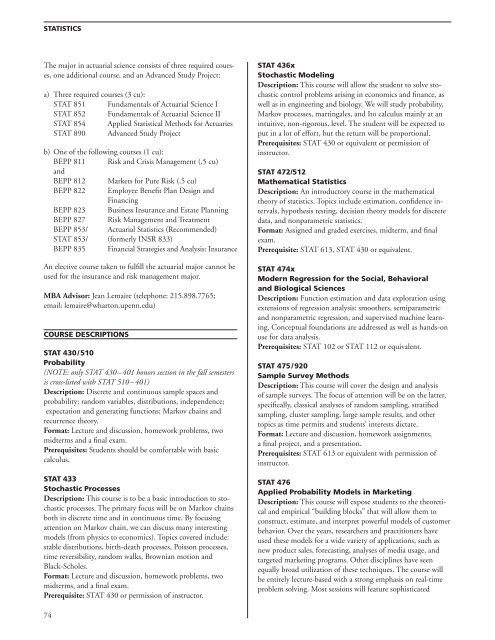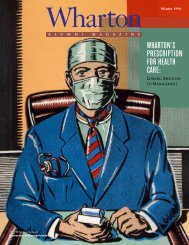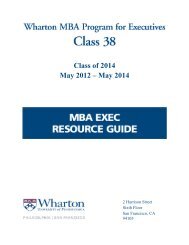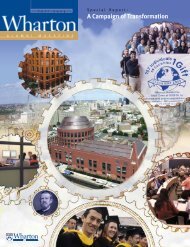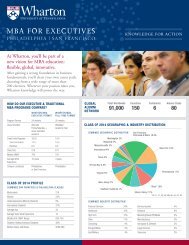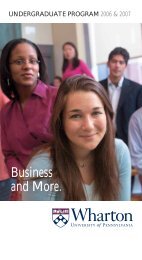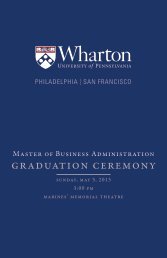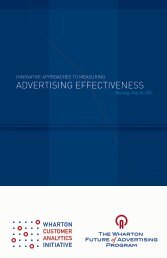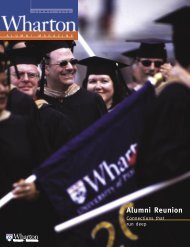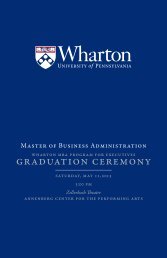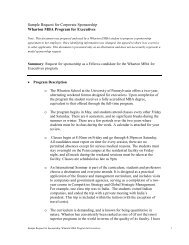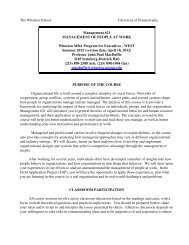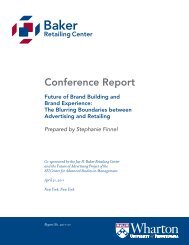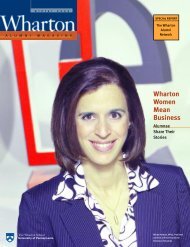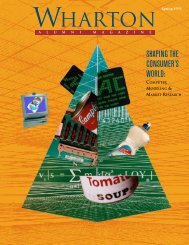Explore Options; Plan Your MBA Academic Program
Explore Options; Plan Your MBA Academic Program
Explore Options; Plan Your MBA Academic Program
Create successful ePaper yourself
Turn your PDF publications into a flip-book with our unique Google optimized e-Paper software.
STATISTICS<br />
The major in actuarial science consists of three required courses,<br />
one additional course, and an Advanced Study Project:<br />
a) Three required courses (3 cu):<br />
STAT 851 Fundamentals of Actuarial Science I<br />
STAT 852 Fundamentals of Actuarial Science II<br />
STAT 854 Applied Statistical Methods for Actuaries<br />
STAT 890 Advanced Study Project<br />
b) One of the following courses (1 cu):<br />
BEPP 811 Risk and Crisis Management (.5 cu)<br />
and<br />
BEPP 812 Markets for Pure Risk (.5 cu)<br />
BEPP 822 Employee Benefit <strong>Plan</strong> Design and<br />
Financing<br />
BEPP 823 Business Insurance and Estate <strong>Plan</strong>ning<br />
BEPP 827 Risk Management and Treatment<br />
BEPP 853/ Actuarial Statistics (Recommended)<br />
STAT 853/ (formerly INSR 833)<br />
BEPP 835 Financial Strategies and Analysis: Insurance<br />
An elective course taken to fulfill the actuarial major cannot be<br />
used for the insurance and risk management major.<br />
<strong>MBA</strong> Advisor: Jean Lemaire (telephone: 215.898.7765;<br />
email: lemaire@wharton.upenn.edu)<br />
COURSE DESCRIPTIONS<br />
STAT 430 / 510<br />
Probability<br />
(note: only stat 430 – 401 honors section in the fall semesters<br />
is cross-listed with stat 510 – 401)<br />
Description: Discrete and continuous sample spaces and<br />
probability; random variables, distributions, independence;<br />
expectation and generating functions; Markov chains and<br />
recurrence theory.<br />
Format: Lecture and discussion, homework problems, two<br />
midterms and a final exam.<br />
Prerequisites: Students should be comfortable with basic<br />
calculus.<br />
STAT 433<br />
Stochastic Processes<br />
Description: This course is to be a basic introduction to stochastic<br />
processes. The primary focus will be on Markov chains<br />
both in discrete time and in continuous time. By focusing<br />
attention on Markov chain, we can discuss many interesting<br />
models (from physics to economics). Topics covered include:<br />
stable distributions, birth-death processes, Poisson processes,<br />
time reversibility, random walks, Brownian motion and<br />
Black-Scholes.<br />
Format: Lecture and discussion, homework problems, two<br />
midterms, and a final exam.<br />
Prerequisite: STAT 430 or permission of instructor.<br />
74<br />
STAT 436x<br />
Stochastic Modeling<br />
Description: This course will allow the student to solve stochastic<br />
control problems arising in economics and finance, as<br />
well as in engineering and biology. We will study probability,<br />
Markov processes, martingales, and Ito calculus mainly at an<br />
intuitive, non-rigorous, level. The student will be expected to<br />
put in a lot of effort, but the return will be proportional.<br />
Prerequisites: STAT 430 or equivalent or permission of<br />
instructor.<br />
STAT 472/512<br />
Mathematical Statistics<br />
Description: An introductory course in the mathematical<br />
theory of statistics. Topics include estimation, confidence intervals,<br />
hypothesis testing, decision theory models for discrete<br />
data, and nonparametric statistics.<br />
Format: Assigned and graded exercises, midterm, and final<br />
exam.<br />
Prerequisite: STAT 613, STAT 430 or equivalent.<br />
STAT 474x<br />
Modern Regression for the Social, Behavioral<br />
and Biological Sciences<br />
Description: Function estimation and data exploration using<br />
extensions of regression analysis: smoothers, semiparametric<br />
and nonparametric regression, and supervised machine learning.<br />
Conceptual foundations are addressed as well as hands-on<br />
use for data analysis.<br />
Prerequisites: STAT 102 or STAT 112 or equivalent.<br />
STAT 475 / 920<br />
Sample Survey Methods<br />
Description: This course will cover the design and analysis<br />
of sample surveys. The focus of attention will be on the latter,<br />
specifically, classical analyses of random sampling, stratified<br />
sampling, cluster sampling, large sample results, and other<br />
topics as time permits and students’ interests dictate.<br />
Format: Lecture and discussion, homework assignments,<br />
a final project, and a presentation.<br />
Prerequisites: STAT 613 or equivalent with permission of<br />
instructor.<br />
STAT 476<br />
Applied Probability Models in Marketing<br />
Description: This course will expose students to the theoretical<br />
and empirical “building blocks” that will allow them to<br />
construct, estimate, and interpret powerful models of customer<br />
behavior. Over the years, researchers and practitioners have<br />
used these models for a wide variety of applications, such as<br />
new product sales, forecasting, analyses of media usage, and<br />
targeted marketing programs. Other disciplines have seen<br />
equally broad utilization of these techniques. The course will<br />
be entirely lecture-based with a strong emphasis on real-time<br />
problem solving. Most sessions will feature sophisticated


